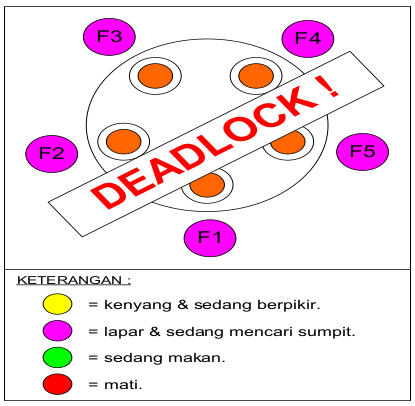Application of Simulation of Dining Philosophers Problem in Concurrent Process
Abstract
A classic simulation that can describe concurrent processes on an operating system is the dining philosopher problem. In the dining philosophers problem, there is the possibility of a deadlock, a condition in which two or more processes cannot continue their execution. This research produces a software application that can simulate the concurrent process and prevent deadlock problems that occur. The benefit of the simulation in this study is as a visualization of the completion of dining philosophers problems and as an additional facility in the teaching and learning process, especially in operating system courses
References
M. Marufuzzaman, S. Al Karim, M. S. Rahman, N. M. Zahid, and L. M. Sidek, “A review on reliability, security and memory management of numerous operating systems,†Indones. J. Electr. Eng. Informatics, vol. 7, no. 3, pp. 577–585, 2019, doi: 10.11591/ijeei.v7i3.987.
W. Salem and M. Hefnawi, “Management of the Processes for Evaluating External Human Induced Events Using Operating Systems Concept,†no. January 2019, pp. 23–29, 2018, doi: 10.13140/RG.2.2.21473.35687.
V. Choppella, A. Sanjeev, K. Viswanath, and B. Jayaraman, “Generalised Dining Philosophers as Feedback Control,†Lect. Notes Comput. Sci. (including Subser. Lect. Notes Artif. Intell. Lect. Notes Bioinformatics), vol. 11969 LNCS, pp. 144–164, 2020, doi: 10.1007/978-3-030-36987-3_9.
A. W. Salim et al., “Implementation Resource Request Alghoritm in Simulation of Deadlock Avoidance,†J. Phys. Conf. Ser., vol. 1230, no. 1, 2019, doi: 10.1088/1742-6596/1230/1/012096.
D. Mourtzis, “Simulation in the design and operation of manufacturing systems: state of the art and new trends,†Int. J. Prod. Res., vol. 58, no. 7, pp. 1927–1949, 2020, doi: 10.1080/00207543.2019.1636321.
S. Zulfiqar, R. Zhou, F. Asmi, and A. Yasin, “Using simulation system for collaborative learning to enhance learner’s performance,†Cogent Educ., vol. 5, no. 1, p. 1424678, 2018, doi: 10.1080/2331186X.2018.1424678.
P. D. P. Silitonga, H. Himawan, and R. Damanik, “Forecasting acceptance of new students using double exponential smoothing method,†J. Crit. Rev., vol. 7, no. 1, pp. 300–305, 2020, doi: 10.31838/jcr.07.01.57.
S. Husnjak, I. Jovović, I. Cvitić, and J. Štefanac, “Overview: Operating Systems of Modern Terminal Devices,†Proc. 5th Int. Virtual Res. Conf. Tech. Discip., vol. 6, no. December, pp. 8–13, 2018, doi: 10.18638/rcitd.2018.6.1.124.
G. P. S. Brijender Kahanwal, Tejinder Pal Singh, Ruchira Bhargava1, “File System – A Component Of Operating System,†Asian J. Comput. Sci. Inf. Technol., 2011.
T. Farah, R. Shelim, M. Zaman, M. M. Hassan, and D. Alam, “Study of race condition: A privilege escalation vulnerability,†WMSCI 2017 - 21st World Multi-Conference Syst. Cybern. Informatics, Proc., vol. 2, no. December 2020, pp. 100–105, 2017.
H. Maghsoudloo, “A Survey of Concurrency Control Algorithms in the Operating Systems,†vol. 3, no. 2, pp. 302–307, 2014.
P. Chahar and S. Dalal, “Deadlock Resolution Techniques: An Overview,†Int. J. Sci. Res. Publ., vol. 3, no. 7, pp. 2250–3153, 2013, [Online]. Available: www.ijsrp.org.
T. Feliciani et al., A scoping review of simulation models of peer review, vol. 121, no. 1. Springer International Publishing, 2019.
Authors

This work is licensed under a Creative Commons Attribution-ShareAlike 4.0 International License.

